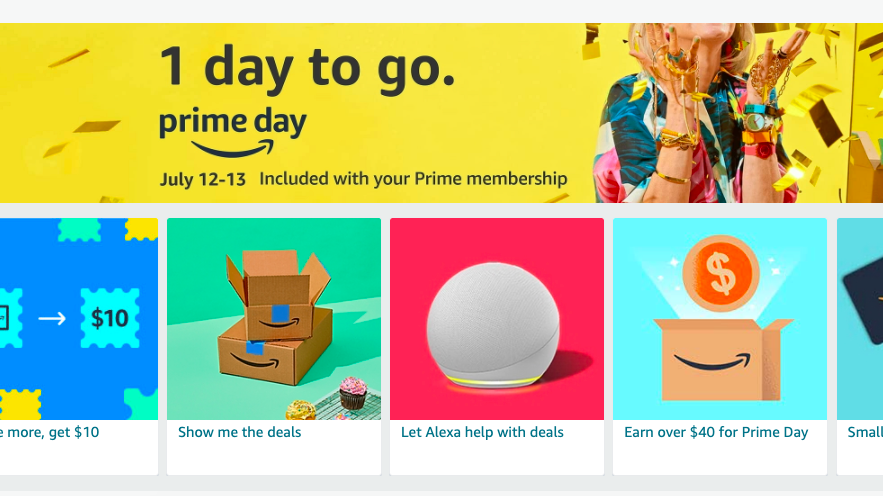Ask Yourself These Questions Before Shopping On Amazon Prime Day
A helpful schema for deciding whether to shop on Prime Day.
Prime Day is coming. But of course, you already knew that. Since its inception in 2015, Amazon's annual version of a Christmas-in-July gambit has paid off big time, with customer interest in Prime Day each summer as regular as a heartbeat, seen here on Google Trends. The TL;DR of Prime Day is that there's a bunch of stuff that will ostensibly be on sale. But as you dash over to Amazon to stock up on whatever's on offer, you might want to stop and ask yourself the following questions before placing an item in your cart.
Do you actually need this kitchen item?
I'm not the angel on your shoulder and I'm not interested in telling you how to spend your money. You don't strictly have to buy things you need. But keeping an uncluttered kitchen is its own reward—one that makes it easier to cook, clean, and take stock of pantry ingredients to make sure everything gets used—so it's a good first question to ask yourself as Prime Day clobbers you over the head with deals.
Maybe you're well aware that something you want is a frivolity, one that can't be justified by pure necessity. That's fine. In that case, proceed to the next question.
Have you wanted this kitchen item for a while?
It's always a good idea to determine where, exactly, your desire for a given item came from. Did a friend recommend it? Did someone you trust endorse it? Have you spotted a community of kitchen-savvy Redditors gushing about it? Or do you really only want that scalloped melon baller because a big, shiny image of it is floating around in the banner ads of your Amazon account on Prime Day?
If you've wanted a given gadget or tool for a while (let's say a month) and your interest in acquiring it hasn't waned over time, then sure, Prime Day might be the opportunity to pull the trigger on it. That is, if Prime Day really is offering the best deal on it. To that end...
Is the Prime Day deal on this kitchen item actually that great a deal?
Each of us needs to decide what our own definition of "a good deal" is. You certainly can't trust the manner in which Amazon displays the products, with impressive figures like a bright red "-40%" slapped onto a product whose starting retail price is $1.89. Is a food processor marked down by 10% really the best deal you're going to find? And is a 10% discount enough to sway you to buy the Hamilton Beach model when you really want the Cuisinart?
The fact that something is being offered at a temporary discount tricks our brains into feeling a sense of urgency to buy it (how often have you seen "ACT NOW!" on an infomercial?). In the case of Prime Day deals, larger appliances like air fryers might be reduced in price by $20 or more, while many of the smaller items are only saving you $1-$2—a discount that you're very likely to encounter again soon, regardless of Prime Day.
Related: I don't know what the recycling situation is like where you live, but there have definitely been times in my life where I'd rather wait until my next trip to the store to purchase an item in person for $0.50 more just to avoid all the Amazon Prime–branded cardboard and bubble wrap I'd have to break down and schlep to the bin.
Do the product reviews sound like they were written by actual humans?
You might be tempted to add items to your cart based on the hefty number of five-star reviews that show up under its name on the Prime Day deals page. However, a 2018 episode of the Reply All podcast posed the question, "Does it seem like Amazon's gotten sketchier?" and the prognosis isn't great. The episode goes on to unravel all the ways in which vendors game the system to flood Amazon with misleading, outright fabricated product reviews.
A quick recap: Amazon prioritizes "verified purchase reviews," which can only be written by people who have had an item delivered to their address. This can, however, lead to vendors sending the packages out to random addresses just to register it having been delivered somewhere—then posting glowing reviews on the technically "delivered" products.
Our sister site Lifehacker has a list of ways to spot fake Amazon reviews. Remember, if an item (kitchen gadget or otherwise) sounds too good to be true, it absolutely is.
Hopefully the above questions help you cut through the noise—the endless, buzzing noise—of Amazon's Prime Day and its painfully hyped deals. Maybe you do walk away from North America's fakest holiday with some long-sought finds; for your sake, we hope none of them have anything to do with cooking eggs.
